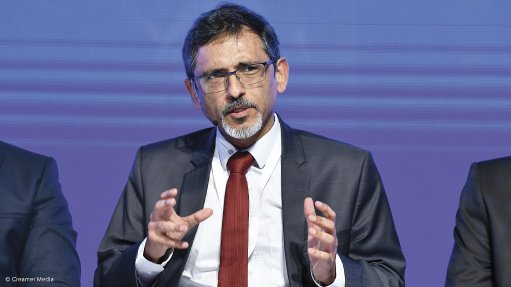Analytics to play a critical role in AI growth
The democratisation of analytics and algorithms will drive the success of the artificial intelligence (AI) boom, says SAS CTO, COO and executive VP Oliver Schabenberger.
Having cemented a central role at the heart of the AI revolution, analytics and data science can become a real growth opportunity for many markets, particularly Africa, which is a prime data-driven region.
“Those who have deployed AI recognise that success in AI is success in analytics,” he says, noting that data without analytics is a value not yet realised, as machines need data to analyse and recognise patterns and then learn from them.
The sheer volume of data available to translate and the ability to build better algorithms are further driving this value proposition, Schabenberger adds.
SAS, which currently holds 30.8% of the global advanced and predictive analytics market, believes there is often a disconnect between data science teams and businesses.
“The data scientists do clever work, but how does the business get informed? When the business expresses the problem, how does the data science team translate that? The closer you can get those two to collaborate, the better. It is part of democratising analytics,” he says, speaking to journalists on the sidelines of the Analytics Experience conference, held in Milan, Italy, last month.
Schabenberger believes the biggest barrier to implementing analytics in a business is operationalising it, unlocking the capabilities of building analytic models, predictions and customer churn, and monitoring and operating a business around key data factors.
A recent survey indicated that, globally, 61% of AI ‘adopters’ expect analytics to have a minor or moderate role, or no role at all, in their organisations’ AI structures, while most AI ‘leaders’ view the two as being inextricably linked.
About 79% of the surveyed companies that report having real success in deploying AI-based technologies say analytics is expected to have a major role in AI, compared with only 14% of those who have not yet benefited from their use of AI.
“Overall, nearly half of those who have deployed AI are more likely to say that analytics will play a full and central role in their AI plans, while those only considering or still developing AI do not see the connection nearly as clearly – roughly a third say analytics will play a minor role in AI – or no role at all,” the report reveals.
“Our latest research indicates that the use of analytics continues to evolve in most organisations, and that many organisations are on the path to using analytics strategically,” SAS notes.
Two Futures
Meanwhile, conversations need to start over the two very different approaches to and futures of AI – narrow AI and artificial general intelligence (AGI) – which will deliver vastly differing implications for jobs, lives and societies.
“And the transition between them exists only in our minds,” Schabenberger says, noting that AGI has yet to be developed.
AGI forms the basis of general thinking machines with the capacity and aptitude of human-level intelligence that can plan, solve general problems across domains faster than humans and undertake general tasks.
“It can do anything but they do not exist yet.”
He comments that, while industry has not yet figured out AGI’s development, the current rate of technology progress necessitates conversations around what will happen once true AI emerges.
“One AGI as smart as the average research team at MIT university can perform, in a single week, the equivalent of 20 000 years of human intellectual work,” he adds, noting that many are asking just how smart machines can become.
“We should rather be asking how machines and algorithms can make humans smarter,” he says.
However, he asserts that machines cannot reason yet.
“They have a very limited and contextual understanding and logical reasoning, and that is partly because of the technology currently used.”
Current technology is capable of analysing data, but it cannot infer reasoning, presenting only ‘snapshots’ that represent certain points of the world, rather that comprehending how the world operates.
There is a gap where the AI technology currently available is solely focused on singular tasks, like driving a car or reading a text.
“It cannot step out of its narrowly defined tasks. “There is no learning and growing [taking place]. There is only improving on that one task,” Schabenberger points out.
While the technology currently being developed will not directly lead to the emergence of thinking, reasoning machines that can be given a problem to assess, plan and solve, industry is on the path to building increasingly better information processing systems.
• Natasha Odendaal attended the Analytics Experience Conference as a guest of SAS.Comments
Announcements
What's On
Subscribe to improve your user experience...
Option 1 (equivalent of R125 a month):
Receive a weekly copy of Creamer Media's Engineering News & Mining Weekly magazine
(print copy for those in South Africa and e-magazine for those outside of South Africa)
Receive daily email newsletters
Access to full search results
Access archive of magazine back copies
Access to Projects in Progress
Access to ONE Research Report of your choice in PDF format
Option 2 (equivalent of R375 a month):
All benefits from Option 1
PLUS
Access to Creamer Media's Research Channel Africa for ALL Research Reports, in PDF format, on various industrial and mining sectors
including Electricity; Water; Energy Transition; Hydrogen; Roads, Rail and Ports; Coal; Gold; Platinum; Battery Metals; etc.
Already a subscriber?
Forgotten your password?
Receive weekly copy of Creamer Media's Engineering News & Mining Weekly magazine (print copy for those in South Africa and e-magazine for those outside of South Africa)
➕
Recieve daily email newsletters
➕
Access to full search results
➕
Access archive of magazine back copies
➕
Access to Projects in Progress
➕
Access to ONE Research Report of your choice in PDF format
RESEARCH CHANNEL AFRICA
R4500 (equivalent of R375 a month)
SUBSCRIBEAll benefits from Option 1
➕
Access to Creamer Media's Research Channel Africa for ALL Research Reports on various industrial and mining sectors, in PDF format, including on:
Electricity
➕
Water
➕
Energy Transition
➕
Hydrogen
➕
Roads, Rail and Ports
➕
Coal
➕
Gold
➕
Platinum
➕
Battery Metals
➕
etc.
Receive all benefits from Option 1 or Option 2 delivered to numerous people at your company
➕
Multiple User names and Passwords for simultaneous log-ins
➕
Intranet integration access to all in your organisation


















